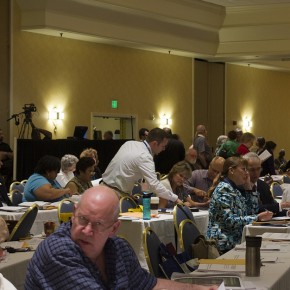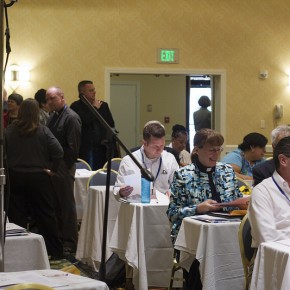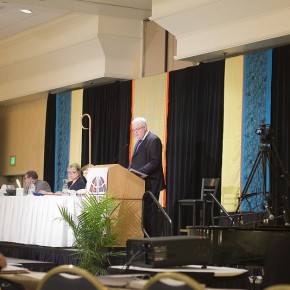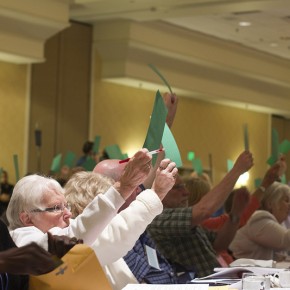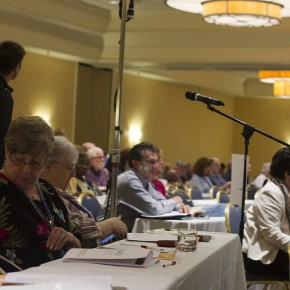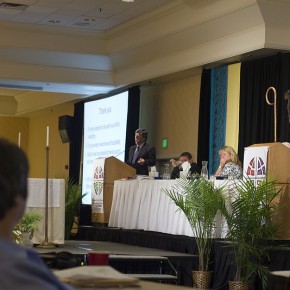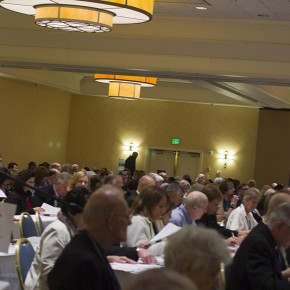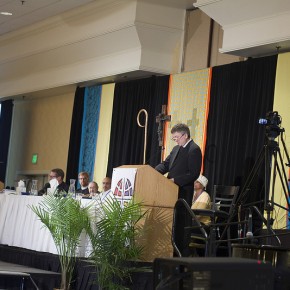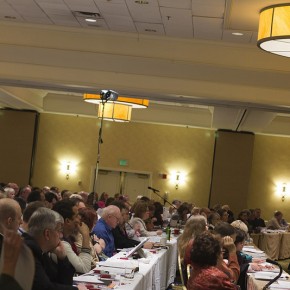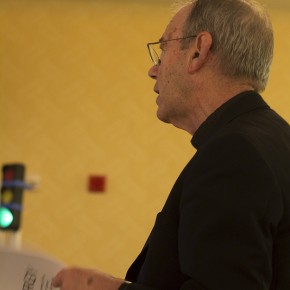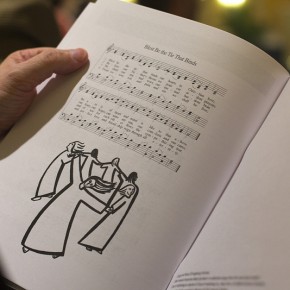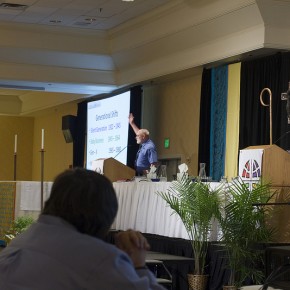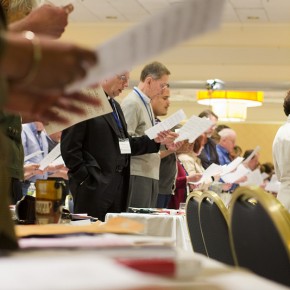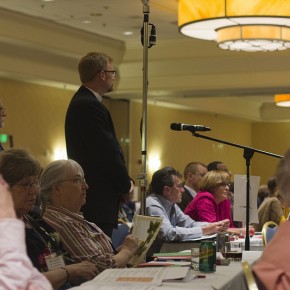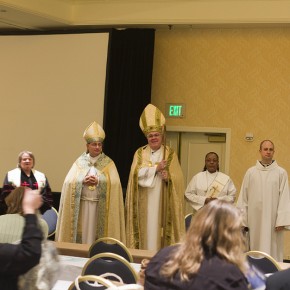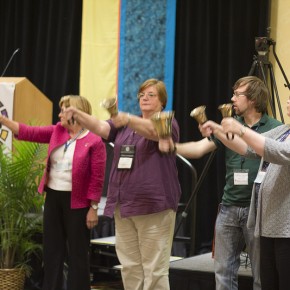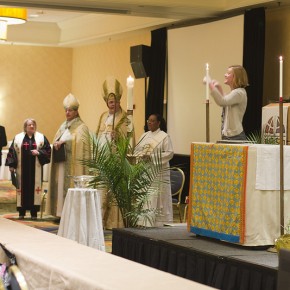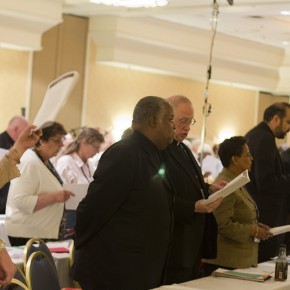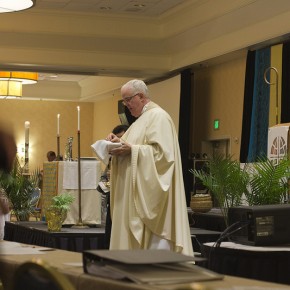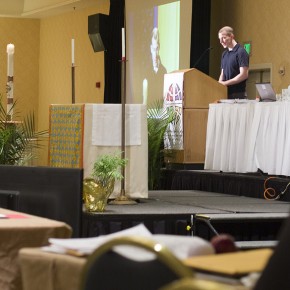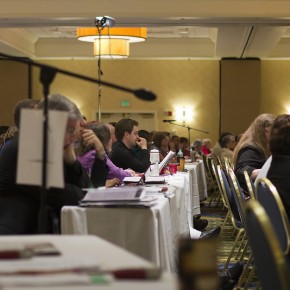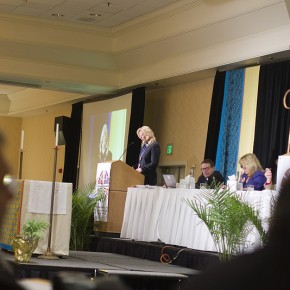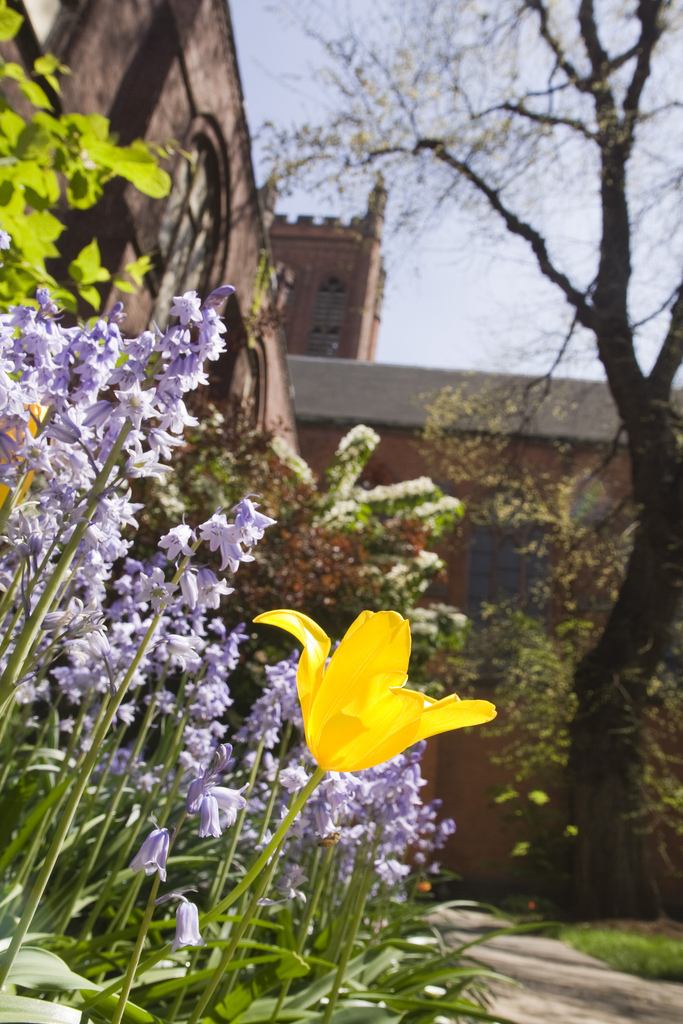
General Theological Seminary, New York City. April 19, 2012
365 Part Deux
Author: MASadmin
365.242 Living the Night Life

Outside Rite Aid in Washington Heights, New York City. April 18, 2012
365 Part Deux
365.241 New York City Jenga

Looking Northeast at 8th Avenue and 23rd St, New York City. April 17, 2012
365 Part Deux
The 2012 MNYS Assembly in Pictures
365.240 Tulips

Tulips in front of the General Theological Seminary, New York City. April 16, 2012
365 Part Deux
The Twitter, she was silent
 If you go ahead and search for #mnys on Twitter, you’ll notice that I was the primary user of that hashtag. In fact, out of the half-dozen of us using the hashtag, I was 90% of it. So, for all the hype about social media, one of the major social media tools out there was not utilized at the assembly. Now, this shouldn’t surprise anyone because even email is problematic for some of the members at the Assembly. So, naturally, when it comes to the use of Social Media, the MNYS struggles.
If you go ahead and search for #mnys on Twitter, you’ll notice that I was the primary user of that hashtag. In fact, out of the half-dozen of us using the hashtag, I was 90% of it. So, for all the hype about social media, one of the major social media tools out there was not utilized at the assembly. Now, this shouldn’t surprise anyone because even email is problematic for some of the members at the Assembly. So, naturally, when it comes to the use of Social Media, the MNYS struggles.
Now, that’s not to say that I’m any good at it. Even though I have professional web development experience, and I use Social Media constantly, I’m really really not good at utilizing it for my work or my church. And I know this because I’m currently working on a project with a really good consultant who really understands not only Social Media but blogging, usability, design, layout, and the sharing of content. Eight years ago, this guy was who I wanted to be. But, over time, I never developed that skillset nor did I ever learn how to ask the right questions. I’m really at the beginning of my journey on how to utilize Social Media for the church and it is something I’m going to need to spend time on to figure out.
But I do know that for Social Media to be effective, it should be used and part of the cry from the recent Assembly was for help. There were countless calls for the Synod to provide frameworks, boilerplate, and materials for congregations to use. What the congregations were asking, I think, was for different kinds of leadership from the Synod. They were looking for a network of knowledge to be centered, and rooted, in the Synod Office. Now, this idea is already built into the Strategic Plan adopted by the Synod but there’s a need for this to happen sooner rather than later. I really did get a sense that there are congregations out there that seem willing to change and to utilize new tools to network with their neighbors and the wider world. I think that there’s more people, regardless of age, who were willing to lead towards change. And I found that very encouraging. But I think the Synod lost an opportunity to at least showcase a little about what might be possible in the way of broadcasting, interacting, and engaging not only the people sitting in the Assembly but also those sitting at home. I do understand that doing so requires times, energy, effort (and money), but I think it might have gone a long way in showing congregations what’s possible. Because I think the question right now for many of them is “what’s possible” and “what’s effective.” The amazing thing is that the videos showcasing the ELCA, the Malaria Campaign, the merging of two congregations, and the development of housing for seniors out in the Hamptons, already does this. We actually are very familiar at inspiring the people at the Assembly. We know how to get people to love attending the event, showing what people and congregations can achieved, and providing people at the assembly with an idea roadmap to bring home with them. I think that members of the MNYS are thirsty for such roadmaps and I think we need to get better at sharing them.
MNYS Assembly, Day 3
Well, after arriving home, unpacking, uploading pictures to flickr and facebook, I figured it is time that I sit and crank out some reflections on this third, and final, day of the 2012 Metropolitan New York Synod Assembly. I will probably also follow up with some reflections on the entire event so I’ll try to keep this a tad focused.
Today was primarily a day of presentations. After spending a late night at a reception thrown together by the Lutheran Theological Seminary at Philadelphia (which was great), I stumbled into assembly hall a little hung over, red-eyed, and ready to seize the day. A friend of mine spoke elegantly about our work with the Lutheran church in Tanzania, and I watched a video about our work in Romania, trying to spot my friends the Churchs, but, alas, they never appeared (which seemed odd). My intern supervisor presented a check to the Synod (and ELCA) that covered the fundraising gathered by my field education church for the ELCA Malaria Campaign. The initial morning events were mellow and low key but I knew it was just the calm before the storm. I’m starting to realize that, being two years into candidacy process, and having attended my third Synod Assembly, I’m starting to notice things that I didn’t notice before. The politics, the use of language, the factions – all are starting to become more clear to me. I loved this assembly because it was the first time I knew people there. But, at the same time, by knowing the people, I began to uncover the currents, rocks, streams, branches, and tree trunks that inhabit our Synod. And I’m starting to realize that I actually am a part of that whole mess too.
I’ll admit that I think I have been stewing over the last few days and today was when quite a bit started coming out. The financial presentation felt slightly dishonest to me. Not dishonest in the sense that it was lying or anything but, rather, it didn’t feel transparent to me. Promoting the savings made in the Bishop’s Office, while commendable, is only part of the entire picture. The large staff, the lack of giving, and the self-funding of the Synod through the sale of churches – that, to me, is the current story. And maybe it wasn’t mentioned in detail because it is just assumed that everyone knows what is going on. The Synod has funded itself in this fashion for years but there seemed to be a lack of ownership of that reality. Although many of the delegates at the assembly are long timers, there were plenty of new people as well. For many of them, that reality is not known. That reality should be highlighted at every Assembly because this isn’t just a conference for the same old people. Yesterday, we adopted a strategic plan to raise up new leaders and to focus on leadership. But here’s the thing – if we’re unwilling to treat new leaders with the respect to be transparent with them, how are we going to fulfill that goal? And, unlike earlier generations, I do not think the current crop of millenials give a crap about being “allowed” into leadership. We’re already here and we’re going to be leaders. The problem isn’t with “us.”
The environmental stewardship committee presented next and…ugh. Honestly, it felt theologically unsound which bothered me because I really like what they do. I really really do. I’m behind them 100% and I believe that stewardship of the environment is part of our calling as caretakers of God’s creation. But I took their use of scripture to be law heavy rather than grace heavy. I think the call to repentance is a good one but I disagreed with how they presented it. I do hope that congregations take their advice and call Con Ed above an energy audit, however. Saving money and helping the earth is always a good idea.
It took awhile but we finally took on the change to the process of the election to the Bishop. I honestly think this was one of the most poorly proposed documents of the assembly. It was presented with the assumption that everyone knew how the election of a bishop in the MNYS works. But we don’t. I mean, the clergy do, but us non-2008 assembly attenders – we have no idea. In fact, I sometimes wondered if even the clergy knew what was going on. As the discussion continued (and I did stand up again to speak on an amendment that, sadly, was voted on before I could say anything), I started coming to the realization that this was devolving into a vote of confidence on the current bishop. Factions who want him to run again and those who don’t were pitting themselves against each other. Every comment about the process being “complex and lengthy” (except in the case of an interim bishop), was really a statement about trying to leave the sitting bishop in place. Some great points of clarification were asked (and I think they weren’t really answered) and there seemed to be more willingness to talk about “the spirit” of the proposed change while ignoring what the letter said. We were given roughly twenty minutes to talk about it but stretched it to over an hour (the fact that folks thought we wouldn’t want to debate on these issues was really, really, silly). The new process, slightly amended, passed roughly 75%-25% (or maybe 70/30). I can’t, sadly, tell the exact count because, once again, we were using the red cards/green cards, rather than the voting machines that could actually SHOW US numbers. The use of the voting machines was a complete waste of time and really, really, poorly implemented and should be rethought for next year.
Anyways, the new process is designed to try and provide a forum for voting members at the 2014 assembly to have a chance to get to know candidates prior to the assembly. It was designed, primarily, in response to the 2008 Synod assembly and the election process that didn’t seem entirely fair. However, the new system creates a committee that seems to have quite a bit of power and, at least in appearances, seems to have had the current bishop’s hand in it (whether that is true – or not – is rather irrelevant because appearances matter quite a bit at these kinds of events). How transparent this process will be, I’m unsure. How well this process will work, I don’t know either. But we’ll see how it works. And we’ll also see how the bishop election in 2014 goes – and it’s obvious the campaign has already been going on for at least a year now.
After a quick lunch, a wonderful Eucharist service was held and we moved on to the 2013 budget. By this point of the assembly, only 40% of the total voting members were in the room. Some questions were asked about the destruction of the Global/Multicultural ministries budget and there were also instances where access to a line-by-line item budget was extremely limited. I felt like those of us on the floor did not have access to all the information we should have and I think the destruction of the Global/Multicultural ministries budget is really upsetting to racial/ethnic minorities in this Synod. Some took a look at that budget line (a reduction of $250,000 from 2011 numbers) and see it as a personal attack on them, their identity, and what they represent and I think I agree with them. Again, whether it is or not, it at least appears to not be clear. As pastors, future pastors, AIMs, deacons, and lay leaders, we’re doing a really shitty job being pastoral to ourselves and our church leaders when it comes to the budget it seems.
Anyways, I’ll reflect on everything later. I loved being there but I’m also seeing myself getting invested in the whole thing. And that’s great but also problematic because I still have two years left in my process. I don’t know where I’m going to end up eventually – and I probably should just tick off everyone and be an equal-opportunity offender /just kidding.
MNYS Assembly Day 2, After the action but before the dinner
Okay, whoever pushed dinner back from 5:45 pm to 6:15 pm…grrrrr on you! Some of us are HUNGRY.
Anyways, so today was a busy day. The morning was spent eating eggs, bacon, and yogurt. The morning session went as expected. A paper ballot was passed out (I was the only Church Wide candidate for Young Adults) which seemed weird since we have these fun clicker things to use. After the paper ballot was passed, we went ahead and watched a lovely ELCA video, heard a stirring message from Pastor Ruben Duran (who is wonderful and full of good lines “The ELCA is 24; time to get out of the house!”) The voting clicker things were explained. And then viability norms were brought up.
After a series of small group discussions, amendments were made, we spent a lot of time talking about what it means to “call a pastor,” and then went went ahead and passed the sucker. We spent a lot of time without changing anything, really. I honestly came to realize that we should have taken viability norms after the strategic plan. By framing it that way (talking about death after we talk about life), I felt that a lot of the viability issues would be directed properely to the strategic plan. But, well, we got through it. Reports were also given and me and the leader at St. Lydias were acknowledged as people in the candidacy process. Why we’re the ONLY ones here seems, well, kind of silly to me. If we’re being formed for leadership, why not see how the church works? Or maybe the idea is for us to not scare us off.
After lunch (which, sadly, was terrible; untasty possibly and I had to skip dessert), I geared up for my presentation. I was part of a duo discussing Project Connect, the Lily Funded organization designed to help bring new, young, emerging adults, into ministry. It went well, I had all the funny lines, and my partner was a lovely woman from Long Island. We geared up with the plan to present right after lunch. But then we noticed that the Strategic Plan discussion was pushed forward. So…we had to wait.
And wait.
And wait.
While people talked about the Strategic Plan. And, like always, we talked a lot. And I think a lot us crashed since it was after lunch. The changes directed towards the plan were tied to evangelism, money, and pastoral care to congregations. The presentation by the committee was fine but long. The discussion was fine but with lots of the same faces appearing at the mics. At one point, I even got up to speak against an amendment but someone stole my thunder (and it failed to pass anyways). Two changes were made to the plan (word changes), and it passed, an hour behind schedule. And then, my debut performance before the Synod initated.
It went well. I enjoyed myself up there, name dropped my professor’s class, tried to be funny, and only lost my place once (but no one could tell). While I’m sitting here, people keep coming up to me saying I did a great job. After the presentation came a presentation by LTSP. And then the document pertaining to “Sacramental Practices” came up – and it was pushed to the next assembly. Now, to be 100% honest, it shouldn’t have been. I learned that the practice of deacons using reserved sacrament in this synod is very prevalent. And, if that is the case, why are we not addressing that issue when we just passed viability norms where “calling a pastor” was on the list? Should we not further define our vision of Order at the same time we’re doing such clarification work when it comes to our vision of ourselves? It shouldn’t have been tabled, the time limit be damned. But it was and, well, bah.
Election results were announced (Churchwide here I come!!!) and a second ballot using the clicky things was done. After more reports, I’m not waiting for dinner to start. People are milling about, the bar is full, and I’m excited because the misses is coming up for the night. I’ll be schmoozing with old seminary people and she’ll be living it up at the pool. This is the good life.
MNYS Day 2, Pre-Game
A night of drinking with clergy combined with being in a new place means, like always, no sleep for the Seminarianzilla. However, after a brisk work out, lots of water, and knowing my hangover won’t hit for a few hours, I’m ready to report on last night’s festivities. (I apologize for the misspellings, poor grammar, and ugly thinking because I’m using a keyboard I don’t like and, well, that whole drinking and no sleep thing.)
I know I said on my twitter feed that I was going to attend the forum on congregation viability norms first but, well, I lied. As I entered that room, I was told that I should go to the candidates room to introduce myself (side note: the person who mentioned I should do that also asked if I wrote this blog and showed it to the bishop so, well, haha…). I did so, put on a sticky saying I’m running for Church Wide Assembly Young Adult spot (which led to a lively debate on what it means to be classified as a young adult), and introduced my platform (“Everyone says millenials are leaving the church and, well, I did the exact opposite; I joined while not growing up in the church and that’s a voice that should be heard too.”) I met a few people, had a nice chat with a clergy person who is trying to figure out how to get Gen-Xers back into the church, and then I headed to viability norms.
Now, it should be noted, that when we’re talking about congergational viability norms, what we’re really asking is “when should the synod step in” to provide leadership for a congregation that is struggling. When I read the resolution the first time, I didn’t pick up on that (and I’m sure that others made the same mistake). The idea is to set up ways to quantify a congregation’s life which, to be honest, I think is a great idea. And I think it’s kind of strange we haven’t had that baseline up till this point. I arrived while the session was going on, joined a small group, and as we read through the MNYS constitution and the ten proposed base points, I felt a little uneasy. As the only seminarian in the room, I was curious how sitting pastors and congregational leaders were going to take these points. And they did exactly what I thought they would which, to be honest, bugged me. A lot.
Point number 2 in the list is that a congregation should have the ability to “call a pastor.” Again, this makes sense. Point number one is that the congregation should be able to gather weekly for worship. Although our polity does not require a pastor at worship, it’s recommended (which makes me think that point number one should be “gather weekly to worship in Word and Sacrament”). There’s no mention of being able to call a full time pastor (which I admitted to having misgivings about) but, again, I think it’s a reasonable point. As a seminiarian who keeps being told that he will need to be “bi-vocational,” full-time calls, while the norms, are not the baseline for congregational realities right now. So, as I sat in a small group, surrounded by half a dozen pastors and half a dozen lay people, everyone – in fact, everyone in the room – focused on point number 2. No one talked about point number 8 (about buildings) or point number 9 (about insurance) or even point 3 (annual meetings). Nope, the pastor. That’s where the battle line was drawn. And I started thinking if having clergy draw up viability norms made any sense because all I saw were clergy defending their own jobs, expressing their anger, frustrations, and reliving their earlier confrontations with congregations that have been under their care. We don’t live in a state church and we live in a synod where ‘Synod Guidelines’ aren’t pushed as much as they use to. And I expect I’ll always have to fight for my job and justify its existence (just like in the freaking real world). But, wow, the anger was so thick. I was embarassed. And it made me not want to attend any of the churches in that room. Which, really, should not be the case at the synod assembly!
There was a lot of blame directed towards “the other.” The other was always the congregation that didn’t have its priorities straight, didn’t pledge enough, was filled with people who owned boats but didn’t want to pay a pastor. The rich other, or the angry other, or the spiritually weak other…it was ridiculous. As an other in society, hearing baby boomer clergy belittling the “other,” even if they are the 1%, was just upsetting. I’ll admit I kept my mouth shut. I probably should have said something. But, wow, I couldn’t believe how angry that 30 minutes in that small group made me.
Because, here’s the thing, we can’t blame the congregations. We can’t sit there and say “it’s their fault we’re not being paid.” We can’t sit there and act entitled to our compensation just because we went through a four year post-bachelor program. There is NOTHING SEXY ABOUT ENTITLEMENT. I’m not saying the church needs to be sexy but I am saying that the church needs to understand that any problem with a congregation in terms of stewardship, or priorities, or all that, is a church-wide problem. If congregation’s aren’t paying what they should, that’s all our problem. If people are taking their kids to soccer practice rather than church, that’s all our problem. We’re one body here and one church. We’re not an us-vs-them group. And, clergy especially, are not set apart like priests. We just aren’t. That’s not the Lutheran approach to clergy leadership. We aren’t Catholics or Episcopalians (I know, I know, massive generalization but hyperbole to make a point is always good). We are raised out of the church to lead in Word and Sacrament, to serve the servants, and to love them. Truly, and deeply, to love them. That does mean that the current baby-boomer driven model of clergydom will have to change. And that’s perfectly fine. There’s a group of young and up-and-coming pastors that know that and are okay with that. We’re going to work hard, we’re going to walk with God’s people, and we’re gonna make it work. Because the reality is that the church is going to change whether you want it to or not. The church has changed. And, to use a line from a bad Broadway musical, you can either “get on the bus” or stay off. And what I heard in that small group made me realize that there are a bunch of us who want to stay off the bus as long as possible.
I do think that the Strategic Plan and the Congregational Viability Norms need some amending. I would like to hear more about “mission” included in the each. I would like to hear more about Word and Sacrament and what it means to be the Church. I think we can take some clues from our ecumenical agreements and see how we acknowledge one another as viable “churches” and bleed some of that into our current dialogue. And, hopefully, that’s what we’ll get today. This morning, we’ll learn how to use our clicky voting machines and we’ll start arguing about these things. I hope our discussion is a good one.
Another side note. I finally received some clarification on a point I was worried about in the Strategic Plan about the use of the sale of church buildings. I was concerned about how it didn’t seem transparent enough and I was worried that the Synod Assembly would have no say in it. The clarification I received made more sense – saying that the line was really in place to minimize the current practice of using the sale of churches to fund current administration practices. Although I don’t know enough how the governance of the Synod works, I’m liking that line more than I use to. I just wish there was some way to get transparency of process into the strategic plan itself.




